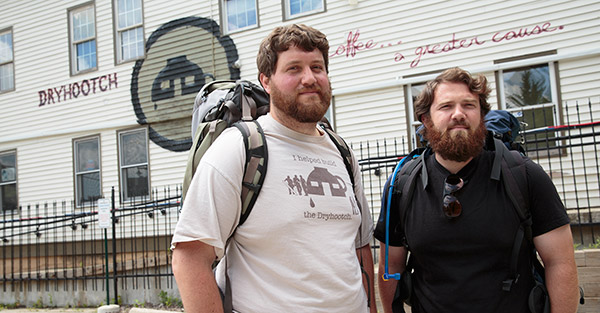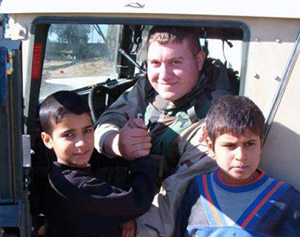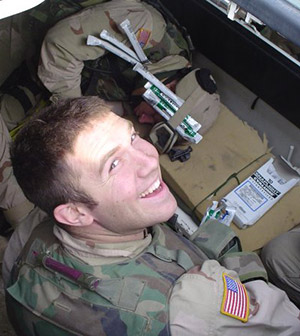
The statistics are grim:
- 22 veterans commit suicide each day.
- At least 20% of Iraq and Afghanistan veterans have PTSD and/or depression.
- 19% of veterans may have traumatic brain injury (TBI).
- 27% percent of veterans met criteria post-deployment for alcohol abuse.
But two veterans from the Milwaukee area are literally putting boots on the grounds to try to improve the odds.
With their “Veterans Trek,” Anthony Anderson and Tom Voss plan to walk from Milwaukee to Los Angeles, with the goal of raising funds for the nonprofit veterans support organization Dryhootch and awareness of veterans’ issues. Both men have ties to UWM, although the two were brought together by Dryhootch.

Anderson graduated in 2012 with a bachelor’s degree in secondary education, with an academic career that began in 2001 and was interrupted by his military service. Voss studied social work at UWM from 2009-11.
Dryhootch provides veterans and their families with a stable, substance-free environment to gather, support each other and enhance their post-service life experience. Dryhootch is growing rapidly in locations and services, and is helping an increasing number of veterans and their families.
Anderson and Voss kick off their journey at 10 a.m. on Friday, Aug. 30, at the Milwaukee County War Memorial Center, 750 N. Lincoln Memorial Dr., and estimate their walk will take five months.
Right now, they are in the process of gathering support (supplies and funding). They have the ambitious goal of raising $100,000 for Dryhootch, but recognize that increasing the average person’s awareness of issues facing veterans may be an even bigger challenge.

“During World War II, people planted Victory Gardens, gas was rationed and kids collected tin cans for the war effort. Everyone had a close family member that was in the military and part of the war effort,” says Anderson. “Today, few of us personally know someone in the military. But we all benefit from the service of military members and veterans. It’s time we all start paying attention.”
As they prepare for their departure, both men say their effort pales when compared to the sacrifices made by active military. Vet Trek does represent a significant contribution of time and effort, however. Anderson, for example, has a wife and baby daughter at home. He’ll miss out on five months of their life together while he’s “walking west.’ His boss, Dryhootch founder and president Bob Curry (also a veteran and UWM alum), granted Anderson a five-month leave of absence from his position as director of operations for Dryhootch of America Inc.
During the gear-up for the walk and while they are on the road, Anderson and Voss are tackling the public education aspect of their trek through traditional and social media. They hope the “Are those guys crazy?” aspect of the trek will encourage others to track their progress as they update their blogs and download video from the road.
As veterans of Operation Iraqi Freedom, Anderson and Voss openly share their struggles in returning to civilian life. The two predict that they’ll meet vets along the way who need support but haven’t connected with fellow veterans. They also anticipate meeting family members of vets facing their own challenges.
“We’ve received Facebook messages from vets who want to walk with us through their own city. By sharing our experiences, we hope to inspire those vets to become active in their own communities,” said Voss.
To learn more, including how to support their effort, visit www.veteranstrek.com.






